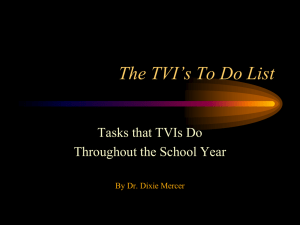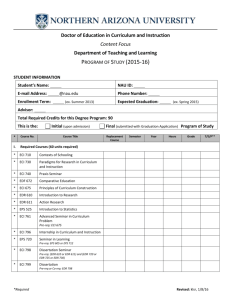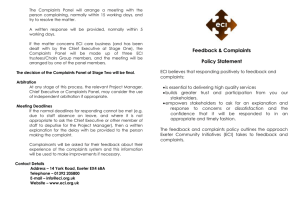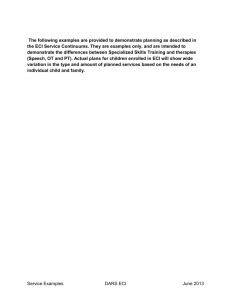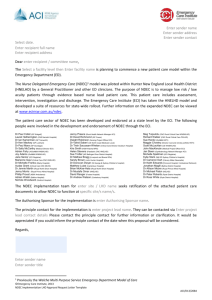The Environmental Challenge Int*l
advertisement
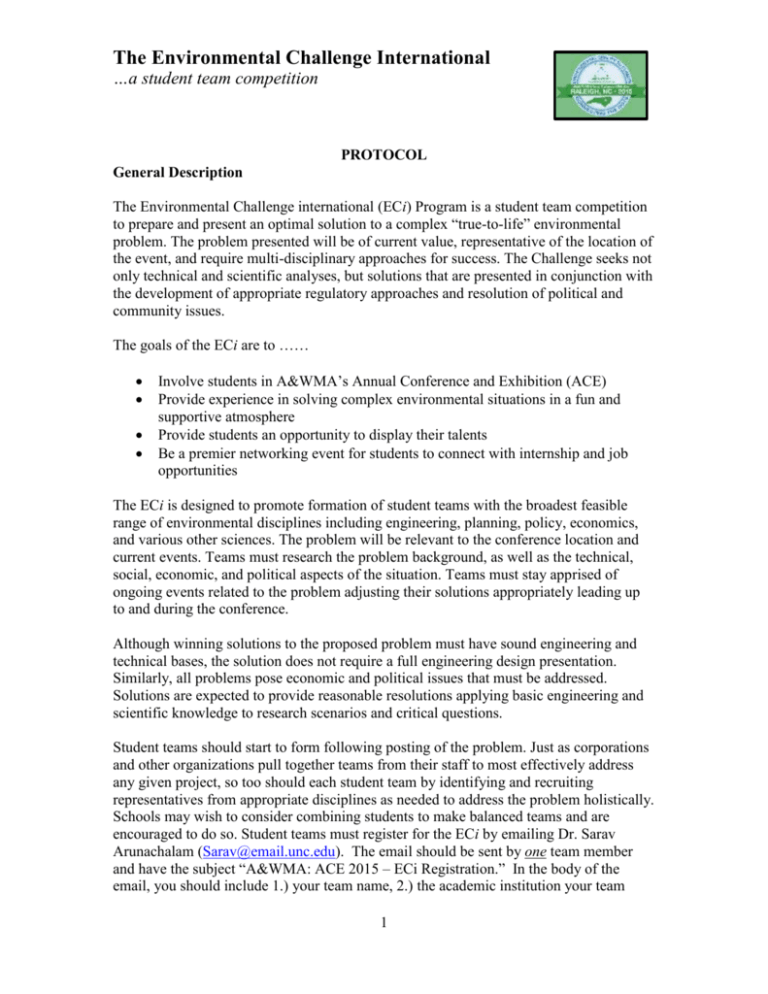
The Environmental Challenge International …a student team competition PROTOCOL General Description The Environmental Challenge international (ECi) Program is a student team competition to prepare and present an optimal solution to a complex “true-to-life” environmental problem. The problem presented will be of current value, representative of the location of the event, and require multi-disciplinary approaches for success. The Challenge seeks not only technical and scientific analyses, but solutions that are presented in conjunction with the development of appropriate regulatory approaches and resolution of political and community issues. The goals of the ECi are to …… Involve students in A&WMA’s Annual Conference and Exhibition (ACE) Provide experience in solving complex environmental situations in a fun and supportive atmosphere Provide students an opportunity to display their talents Be a premier networking event for students to connect with internship and job opportunities The ECi is designed to promote formation of student teams with the broadest feasible range of environmental disciplines including engineering, planning, policy, economics, and various other sciences. The problem will be relevant to the conference location and current events. Teams must research the problem background, as well as the technical, social, economic, and political aspects of the situation. Teams must stay apprised of ongoing events related to the problem adjusting their solutions appropriately leading up to and during the conference. Although winning solutions to the proposed problem must have sound engineering and technical bases, the solution does not require a full engineering design presentation. Similarly, all problems pose economic and political issues that must be addressed. Solutions are expected to provide reasonable resolutions applying basic engineering and scientific knowledge to research scenarios and critical questions. Student teams should start to form following posting of the problem. Just as corporations and other organizations pull together teams from their staff to most effectively address any given project, so too should each student team by identifying and recruiting representatives from appropriate disciplines as needed to address the problem holistically. Schools may wish to consider combining students to make balanced teams and are encouraged to do so. Student teams must register for the ECi by emailing Dr. Sarav Arunachalam (Sarav@email.unc.edu). The email should be sent by one team member and have the subject “A&WMA: ACE 2015 – ECi Registration.” In the body of the email, you should include 1.) your team name, 2.) the academic institution your team 1 represents, and 3.) the name and email of each team member. Please note: Each team member must register for ACE in addition to registering for the ECi. Once teams reach the conference, preparation of broad background knowledge of the challenge topic will be the key to a successful competition. Role players in the ECi problem will be identified and available for students to approach with questions and to consult for opinions. The role players are A&WMA conference attendees and professionals in the environmental field. Students should approach conference attendees and exhibitors to identify additional individuals with expertise that is germane to the ECi problem. The conference is a premier networking opportunity and the ECi problem provides an excellent topic for discussion and networking. The role players provide a key interaction for the ECi participants as direct feedback on their solutions, asking questions to prepare the students for the project presentations, and enhancing the student networking experience at ACE. The role players are also critically involved in a “tweak” (added complication to the problem) that tests the students’ knowledge of the challenge topic. ECi COMPETITION PREPARATION Eligibility Student teams may not contain more than 5 members and are generally comprised of 3 to 5 undergraduate students, graduate students, Ph.D. candidates, or recent graduates, or a combination thereof. Multiple schools may wish to consider combining students to create balanced teams and are encouraged to do so. A student is defined as an individual who is enrolled in an academic institution or a recent graduate of no more than one year and does not hold a full time job. Expectations for proposed problem solutions Solid technical analysis, logic train, process, conceptualizations, and creativity are all critically important to the proposal and presentation composition. Clear and concise presentation of your thoughts in a public forum is paramount to success. Your team will need to make reasonable assumptions as part of the solution. The assumptions must pass the “straight-face” test. This is (almost) the real world! The proposal must identify each team member by name and the role they will have in the presentation (e.g., “Sally Smith” is the lead project engineer and will address waste issues, “Jim Jones” is the city planner; include the disciplines that you think you need). Written Proposal Each team must submit, via email to Dr. Sarav Arunachalam (Sarav@email.unc.edu), a written proposal in advance of ACE 2015 – June 5, 2015 - addressing the problem. The Proposal must be received by 5:00PM EST. The written proposal should provide an outline of the approach that your team is going to take, the issues that you will be discussing, include the names and roles of each team member, and shall not exceed 3 pages. The written proposal will contain a cover page with the team name, name of academic institution representing, each team member’s name and email. The cover page is not included as part of the proposal’s 3-page limit. Additionally, references and appendices are not included in the proposal’s 3-page limit but please keep in mind the judges will only be scoring based on the 3-page proposal. The written proposal should be 1.5-spaced, 12 point Times New Roman, with 1” margins. Written proposals will be distributed to the ECi judges on June 12, 2015 with a scoring form. The Tweak No matter how much you do and know, in real life unexpected events and expectations can and do occur in real life. To this end, you should expect (available on June 15, 2015 on the A&WMA ACE website) some late breaking information that might alter your approach to the solution. The problem and the tweak will require that you find and talk to “experts” and attend technical sessions, during the conference, for answers and important information. Role Players During the conference you will be required to speak with role players involved with the problem. These role players will be project proponent(s), regulators, politicians, activists, and other expected or unexpected individuals critical to creating a solution to the problem. Role players will offer insight and clarify any additional questions each team may have in relation to the problem. During the ECi orientation, roll players will be introduced and their availability/locations will be made known. Role players will also be judging your interactions with them. When meeting with role players please use professionalism during all business meetings and technical and plenary sessions and have fun while remembering your environment. While these role players are critical, so are the technical sessions and exhibitors that are related to the problem. Poster Presentation Each team must prepare and bring a poster presentation of the proposal to ACE. ECi POSTER GUIDELINES (based on A&WMA poster guidelines) The entire team must be present for the poster presentation at the A&WMA Annual Conference. Each ECi team will be assigned one side of a 4-foot-high-by-8-foot-wide poster easel in the Exhibit Hall. The poster number will be assigned at arrival and dictate each team’s location. The easel is composed of a soft material that allows easy mounting with pushpins. Your poster must include title, university representing, and the full team listing. Figures, graphs, and tables should be uncluttered and simple and arranged in the sequence in which you want them to be viewed. Team members should prepare a brief “elevator speech”, to be given during the judging period. Judges will only be at your poster for 2-3 minutes. The poster presentation should summarize important assumptions and conclusions and clearly articulate proposed solutions to the challenge problem. A limited number of copies of the written proposal should be available for distribution to interested individuals. Additionally, creativity is critical; hand-outs and other exhibits may be used to further advertise your poster. ECi teams are required to attend the Student Welcome Reception/ECi Orientation meeting on Tuesday, June 23 from 11:30 p.m. to 12:30 p.m. The location of this event will be available within the conference program. The event will review the ECi problem and procedures, introduce role players, and answer general ECi presentation questions. Poster setup is on Tuesday, June 23, beginning at 2:00 p.m. and should be completed by 2:30 p.m., with the area clean and ready for viewing. Judging will take place June 23 from 2:30 p.m. to 5:30 p.m. THE FINAL PRESENTATION Dependent on the number of teams entered into the ECi, only a limited number of teams may be chosen for the final presentation. The combined scores from the written proposal, poster, and role player interaction will be tallied and the top scoring teams will progress to the final phase of the competition. For the final presentation, teams must demonstrate their understanding of the issues in the written proposal and poster presentations and address the tweak. Sustainable approaches for these and other site issues are of great interest to the owners. The winning team presentation will be strong in approach, logic, clarity, application, and creativity. Each of the teams will present their problem solution on Wednesday, June 24 from 2:00 – 4:00 p.m. during the technical session program that day. Presentation order will be chosen randomly. A computer and projector will be provided for the presentation (with Microsoft PowerPoint is required and you must use the room computer, bring .ppt). Please bring your presentation on a data stick or disk to be transferred to the computer. Plan for no more than a 15-minute presentation followed by 5 minutes of questions and answers. Judging Dependent on the number of teams entered into the ECi, only a limited number of teams may be chosen for the final presentation. The combined scores from the written proposal, poster, and role player interaction will be tallied and the top scoring teams will progress to the final phase of the competition. The number of teams selected for final presentation will be dependent on the allotted time for presentations (up to 8 teams may advance to the final presentation). Judges’ scores will be tallied immediately following the ECi poster session. The top teams for the final competition should then be prepared to put the finishing touches on their presentations. Overall ECi winners will be announced at the Student Awards Ceremony and Reception on Wednesday, June 24, from 5:00 p.m. to 6:00 p.m. Overall ECi Competition Prizes* Place 1 2 3 Prize $5,000 $4,000 $3,000 *ECi Competition Prize denominations are subject to sponsorship level and may change prior the event. ECi Timeline: DATE TIME June 5, 2015 June 12, 2015 June 15, 2015 June 23, 2015 EVENT ECi Proposal Due to Dr. Arunachalam ECi Proposals Sent to Judges ECi Tweak posted on ACE website A&WMA Annual Conference & Exhibition Commences 11:30 a.m. – 12:30 p.m. 2:00 p.m. – 2:30 p.m. 2:30 p.m. – 5:30 p.m. Welcome Reception/ECi Orientation ECi Poster Set-up ECi Poster Presentation June 23, 2015 2:00 p.m. – 5:30 p.m. ECi Role Player Interviews June 24, 2015 2:00 p.m. – 4:00 p.m. 5:00 p.m. – 6:00 p.m. ECi Presentations Student Awards Ceremony and Reception Questions should be directed to: Dr. Sarav Arunachalam (Sarav@email.unc.edu)

